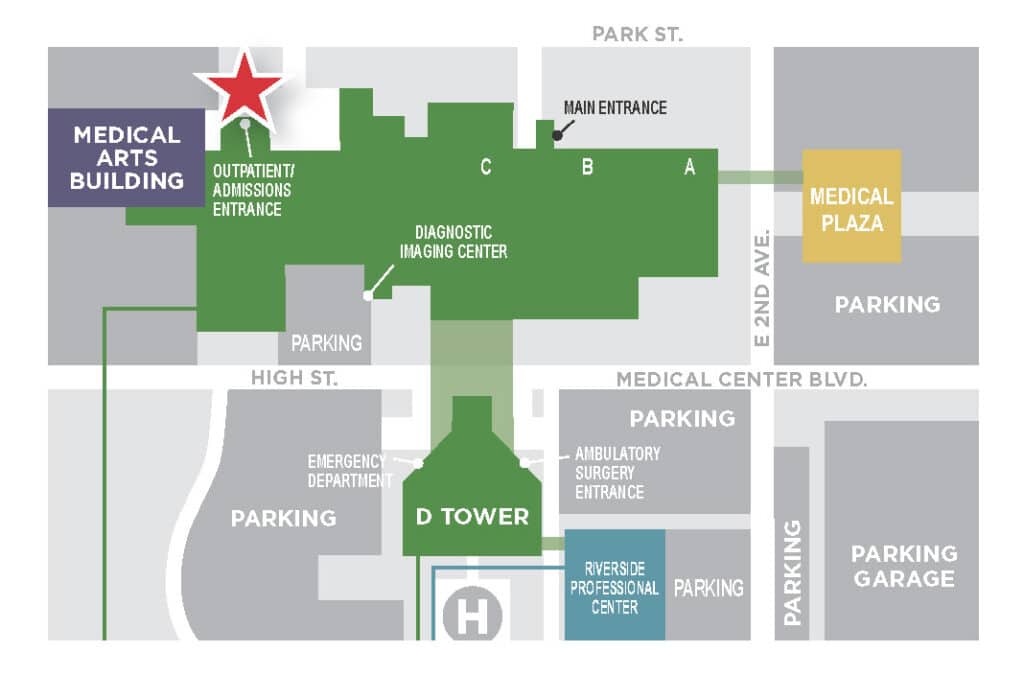Cardiac Cath Lab
Seconds count during a heart attack. Experts at The Medical Center at Bowling Green’s Cardiac Cath Lab are on call 24/7 to perform emergency procedures designed to not only save lives, but do it in a way that preserves heart muscle and allows for a faster recovery.
State-of-the-Art Catheterization Lab treats Heart Attacks Quickly and Efficiently
The Cardiac Catheterization Lab is a critical feature of The Medical Center at Bowling Green’s Chest Pain Center. Cardiologists and specially-trained staff are ready 24 hours a day, 7 days a week to perform percutaneous coronary interventions (PCI, also known as cardiac catheterizations) for the emergency treatment of patients suffering a heart attack. This treatment allows cardiologists to go directly to the source of an obstruction to preserve heart muscle and potentially reduce serious complications or death.
The Cardiac Catheterization Lab is a vital tool in the diagnosis and treatment of heart disease. A highly-skilled team of physicians, nurses and technologists focus on quick intervention for heart attack patients.
Procedures include cardiac catheterization, coronary angioplasty, coronary stenting, percutaneous aortic balloon valvuloplasty (PABV) and transesophageal echocardiograms (TEE).
The Medical Center at Bowling Green is the only provider in Bowling Green to be accredited by the American College of Cardiology as a Chest Pain Center with Primary PCI.
Preparing for a Heart Catheterization

On the day of your heart catheterization, please enter through the large revolving doors at the Outpatient Entrance located on Park Street.
- If you are using CPAP at home, please bring the machine to the hospital on the day of your procedure.
- Please do not wear jewelry; however, you may wear glasses during the procedure. Please leave valuables, such as money and credit cards, at home or with your family.
- In the prep/recovery room, there will be an intravenous (IV) line in your arm or hand. The IV will administer fluids and medications before, during, and after your procedure. The nursing staff will ask you questions to complete your medical history.
- Please bring all medications in the original containers with you to the hospital.
- Please bring an overnight bag with you to the hospital in the event that you are
admitted. - An arterial site will be prepped for the catheterization. The site will be in your groin, arm, or wrist area. Hair from this area will be removed in order to decrease your risk for infection.
- Before the procedure, you will be asked to sign a consent form, and any additional questions you may have will be answered.
The night before
Do not eat or drink anything after midnight (except for sips of water to take your morning medication) unless otherwise instructed by your physician.
The morning of your procedure
Please shower. This will reduce the number of bacteria that live on your body. Do not apply lotions, powders, or deodorants. Thoroughly bathe the groin, arm, and wrist areas of your body. Dress in freshly laundered clothes.
Travel to and from the hospital
Please arrange transportation to and from the hospital. You will not be allowed to drive yourself home, take public transportation or a cab. After your procedure is completed, you may be discharged (usually several hours later) or admitted to the hospital overnight, depending on the outcome of your test. Your doctor will inform you and your family of your discharge plan immediately following the test.
Arrival to the Cardiac Catheterization Laboratory
When you arrive at Outpatient Services, please give your name to the person at the main desk. After registration, you will be escorted to the Cardiac Catheterization Laboratory on the 2nd floor. Your family must remain in the waiting area during your prep time and scheduled procedure. However, they are permitted to join you before and after these events. Your doctor will meet with your family and guests immediately after your procedure. For patient and child safety, children under the age of 12 are not permitted in the prep/recovery room. To ensure a quiet environment, visitors are limited to two per patient at one time.




